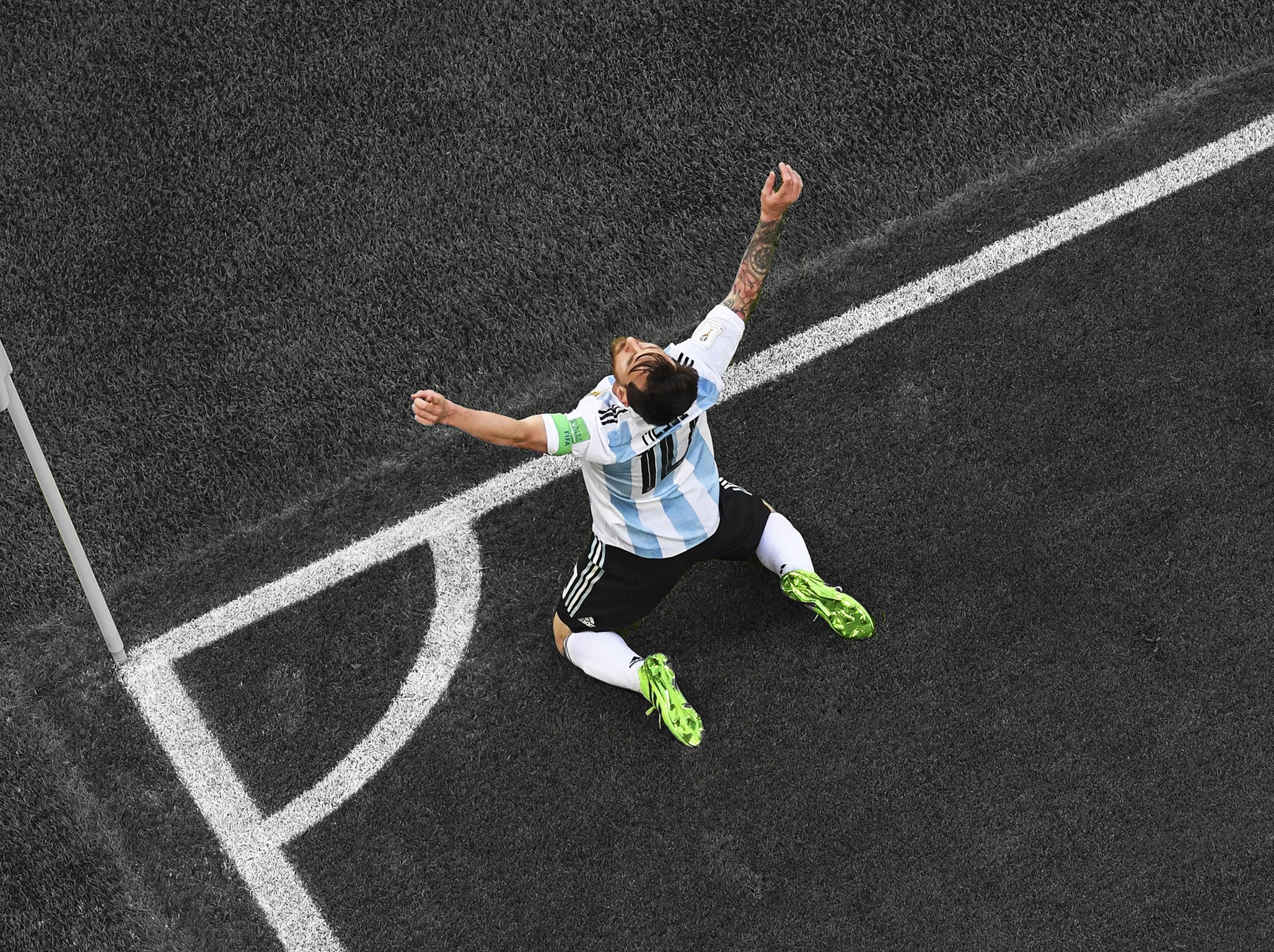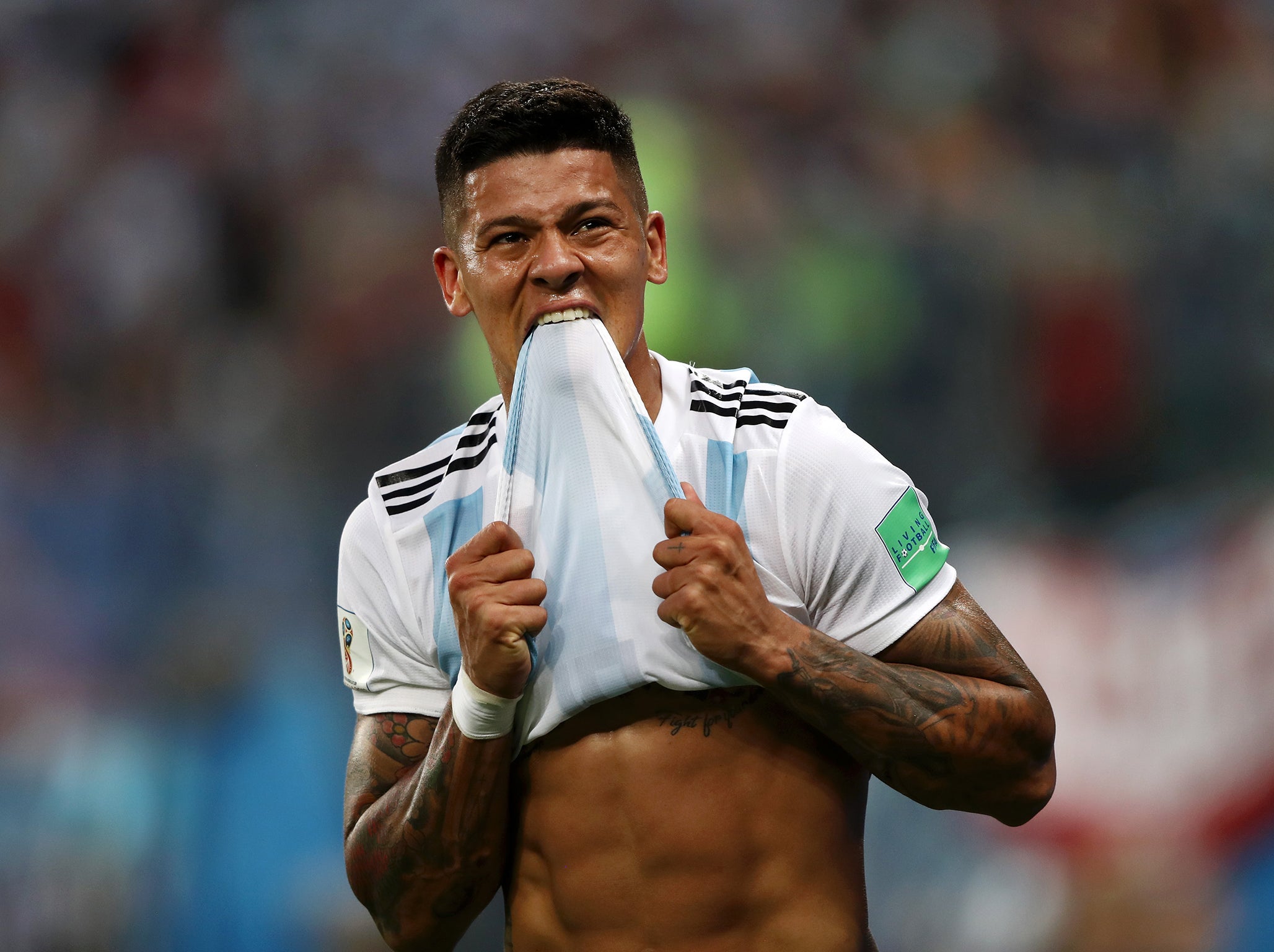World Cup 2018: Lionel Messi finally freed from his absurd burden on night Argentina learn to rescue themselves

Your support helps us to tell the story
From reproductive rights to climate change to Big Tech, The Independent is on the ground when the story is developing. Whether it's investigating the financials of Elon Musk's pro-Trump PAC or producing our latest documentary, 'The A Word', which shines a light on the American women fighting for reproductive rights, we know how important it is to parse out the facts from the messaging.
At such a critical moment in US history, we need reporters on the ground. Your donation allows us to keep sending journalists to speak to both sides of the story.
The Independent is trusted by Americans across the entire political spectrum. And unlike many other quality news outlets, we choose not to lock Americans out of our reporting and analysis with paywalls. We believe quality journalism should be available to everyone, paid for by those who can afford it.
Your support makes all the difference.Lionel Messi had his redemption, and Argentina had theirs, but not at the same time.
To see the Argentina bench explode onto the pitch at the end, the players tearfully embracing in the centre-circle, it felt like they had won a semi-final. In fact, they had avoided an even more humiliating outcome than their 3-0 defeat to Croatia last week. Argentina were four minutes away from a 1-1 draw here, that was briefly going to leave them fourth in Group D.
One unlikely swing of Marcos Rojo’s right boot was enough to win them the game and send them through to the last-16, starting a party that will go on in St Petersburg all night. It felt so unlikely, a moment of historic deliverance for Argentina, with Messi nowhere near it.
Of course Messi was at the heart of the celebrations at the end, hugging every team-mate, substitute and staff member, except of course Jorge Sampaoli, waving to the tens of thousands of Argentina fans, who were singing his name. His World Cup story will continue for at least another match, going to Kazan this weekend to face France.
And that is exactly what Messi deserved. After the pain of Croatia, when he looked broken by pressure and a stranger to the player we all know, here he was back to his best. He proved what had been ludicrously doubted, that he can still perform for Argentina. His first-half goal, a three-touch masterpiece of timing, speed and technical precision, was a goal that almost no-one else in football history could have scored. Not quite like that.
It felt, in first-half flashes, as if this was the night that Messi and Argentina would meet again, each finally helping the other, rather than dragging each other down. The system was changed to get the best out of Messi and he had responded with exactly that. This was how it was meant to work.
When Messi gave the team-talk just before the second half, Argentina looked in perfect union again. But the team collapsed, Javier Mascherano gave away a needless penalty, the rest of the team did not know how to react, and it was painful and difficult to watch. The biggest difference between this game and the Iceland draw, was that tonight, through the unlikeliest source, they got there in the end.
It suggests a small movement in the right direction, but only that. One thrilling step forward, one anxious step back. Argentina did find a way to get more out of Messi, and they did stumble on a way to win. But what they need to do in Kazan, and beyond that, is to do both.
Peel back all the pain and humiliation in Argentina about the Croatia game, and you eventually get to the guilt. Guilt that this team has been so poor for so long, and the atmosphere around it so toxic, that they had burdened Messi with so much that he eventually buckled. That had been the story of the World Cup so far, both the missed penalty against Iceland and the 90-minute anxiety attack against Croatia. Even Messi could no longer cope.
But after the nadir of Nizhny Novgorod, they realised this. Jorge Valdano wrote with feeling of his profound regret that Messi had started to believe that this was all his fault, that he had become a “tortured soul” because of that impossible weight upon him, that he had taken all the blame to heart.
And if the first two games were about Argentina weighing down Messi until he broke, tonight in St Petersburg was when they belatedly realised they had to lift him up.

Against Croatia, Messi was drowning deep in midfield. Too impatient to trust his team-mates, trying to run the game by himself. He would pick up the ball on the half-way line, but up against two of the midfielders in this competition he would only ever do more harm than good. And the more responsibility Messi shouldered, the worse he stumbled.
Only by lifting that absurd burden could Argentina get Messi to do what he did. Moved further forward, back into that favoured role as an inside right in a 4-3-3, he was freed up from the demands of ubiquity. Nearer the Nigerian goal, he could join play one phase later, a few seconds after, 20 metres further up the pitch.
And what do you get as a reward? A goal that could have belonged only to Messi. Running in behind Kenneth Omeruo - a run he would have never made in the Croatia game - he was spotted by Ever Banega, who darted a diagonal from the half-way line. Running straight at goal, twisting his upper body to the left, Messi took the ball down on his left thigh, touched it forward with his left boot, beat the keeper with his right foot, while never breaking stride.

That would have been enough, but as good as he is with a moving ball, there is plenty that Messi cannot control. Like Mascherano’s tiring legs, his bad judgement, poor passing and the reckless pull that gave away the penalty. Or Rojo’s own needless sticking out of an arm, that nearly cost Argentina a penalty that would have killed them. Or Gonzalo Higuain’s misfiring up front, wasting a good chance in each half, the first set up by Messi himself. Or the lack of quality on the bench, or the lack of authority from the coach.
All those problems looked set to cost Argentina, and cost Messi, no matter how good his goal was. It would have been the bitterest personal redemption, one of no value to a player who has far less to prove than he might think. For once, he saw his team-mates rescue themselves, and now they will get another match. But can they all pull together for one whole game? Will they ever deliver more than just a half?
Join our commenting forum
Join thought-provoking conversations, follow other Independent readers and see their replies
Comments